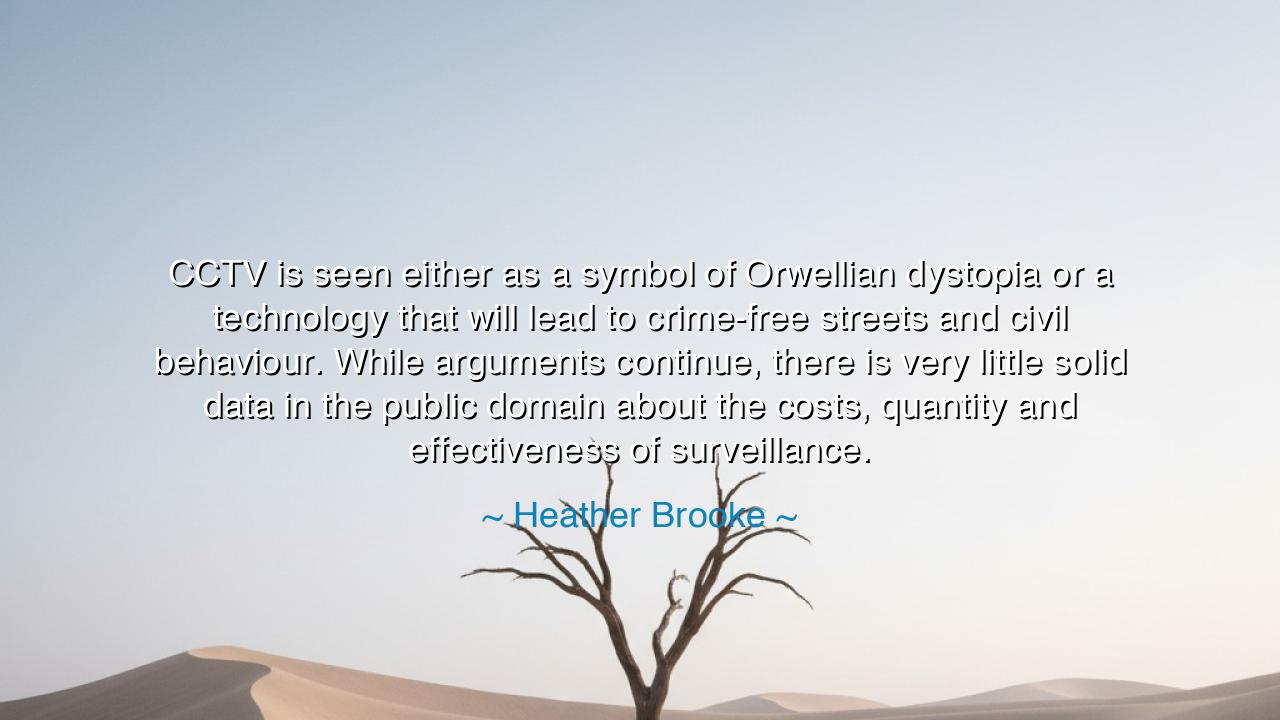
CCTV is seen either as a symbol of Orwellian dystopia or a
CCTV is seen either as a symbol of Orwellian dystopia or a technology that will lead to crime-free streets and civil behaviour. While arguments continue, there is very little solid data in the public domain about the costs, quantity and effectiveness of surveillance.






The journalist and freedom-of-information advocate Heather Brooke once wrote with piercing clarity: “CCTV is seen either as a symbol of Orwellian dystopia or a technology that will lead to crime-free streets and civil behaviour. While arguments continue, there is very little solid data in the public domain about the costs, quantity and effectiveness of surveillance.” In these words lies a meditation on the double-edged nature of surveillance technology, and the shadows it casts over freedom, trust, and truth.
Brooke calls forth the ghost of George Orwell, whose vision of dystopia in 1984 warned of an all-seeing eye that crushes individuality and silences dissent. To many, the rise of CCTV — cameras perched on lampposts, shops, and street corners — evokes that same fear: a society where the gaze of power is constant, where no one can act unseen, where privacy is dissolved into nothingness. This is the ancient fear of control, reborn in the modern age.
Yet she also acknowledges the opposing hope — that such technology may guard the innocent, deter criminals, and build safer communities. The idea of crime-free streets, of a civil society where misdeeds are prevented by the simple presence of cameras, appeals to the yearning of all people for peace. In this vision, surveillance is not a chain, but a shield. Thus, the debate rages between two extremes: freedom endangered and security assured.
But Brooke’s wisdom strikes deeper: she reminds us that beneath these grand arguments lies a void. There is little solid data available to the public about the true effectiveness, the real costs, or even the actual quantity of surveillance. What we debate, she suggests, are shadows and guesses. Fear and hope flourish when truth is withheld. The true danger may not only lie in the cameras themselves, but in the secrecy that surrounds their use. Without transparency, even the noblest tool can become a weapon of distrust.
History echoes this lesson. In East Germany, the Stasi built one of the most comprehensive surveillance states the world has ever known. Every whisper, every action was reported, catalogued, and watched. Yet far from creating a society of peace, it created one of suspicion and silence. Neighbors feared neighbors, families feared themselves. Surveillance promised safety, but it delivered oppression. The price of secrecy and control was the destruction of trust.
At the same time, history also shows how oversight and accountability can transform surveillance into a tool for good. Modern cities that publish crime statistics, ensure independent monitoring of CCTV, and allow citizens to question their use can harness such technology for safety without descending into tyranny. The key is not the cameras themselves, but the openness and responsibility with which they are governed.
The lesson, then, is this: do not blindly embrace technology, nor blindly condemn it. Instead, demand truth, transparency, and accountability. Recognize the double nature of surveillance — both guardian and threat — and guide it with wisdom. For if the people remain blind to its extent and cost, they surrender power to unseen hands. But if they watch the watchers, if they demand openness, then even surveillance can serve freedom rather than destroy it.
Therefore, O seekers of wisdom, hear Heather Brooke’s warning. Fear not only the eye of the camera, but the silence of withheld truth. Do not let hope or fear blind you — instead, demand knowledge, for knowledge is the true safeguard of liberty. Let every tool of technology be tested in the light of truth, lest shadows swallow freedom itself.






AAdministratorAdministrator
Welcome, honored guests. Please leave a comment, we will respond soon